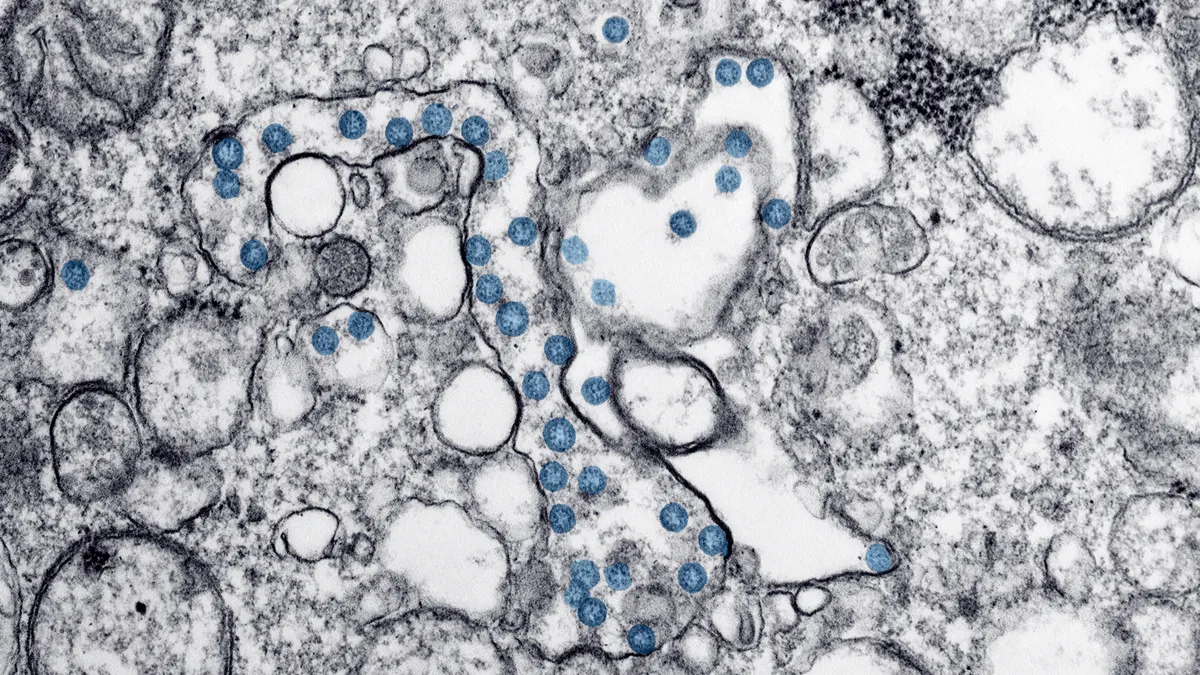In Buffalo, New York, the Erie County Public Health Lab is rapidly running out of test kits, reagents and swabs needed for coronavirus diagnostic testing.
The lab, which serves a county in western New York State with nearly 1 million residents, is a microcosm of the larger challenges confronting America's public health labs as they attempt to confirm COVID-19 cases and get a handle on the scope of the virus outbreak in their areas.
The Erie County Public Health Lab started with enough materials to support 450 coronavirus tests and has quickly seen its lab supplies shrink as demand for testing has risen.
The public health lab is "overwhelmed" amid working nonstop to address the coronavirus outbreak. However, "At this point, it's not an issue of staff. It's an issue of will we have enough reagents and swabs to be able to perform the task at hand," said County Executive Mark Poloncarz during a press conference on Tuesday.
"There is unfortunately tremendous demand across the country," Poloncarz added, noting that his county's public health lab is not the only one dealing with supply shortages. "I know from talking to my colleagues elsewhere, and I'm not just talking about New York State, in the country this is a significant concern."
It's a concern shared by FDA Commissioner Stephen Hahn who testified before a House appropriations subcommittee last week that the agency is "aware of pressure in the supply system on the reagents" needed by public and commercial labs to perform COVID-19 tests.
Hahn said during a press briefing late Monday that a critical role FDA plays in combating the coronavirus outbreak is to "help the labs get what they need to run tests." Nonetheless, he acknowledged there is "pressure" on the supply chain when it comes to reagents, swabs and transport media that labs require to conduct COVID-19 testing.
"We do recognize and certainly have heard the concerns about supply and we are working around the clock to get that information to laboratories," Hahn said. "We have been leaning in on manufacturers both of the tests but also of these other supplies that are needed."
Qiagen, which received BARDA funding last week for a COVID-19 test, announced Tuesday it plans to "dramatically" ramp up global production capacity for RNA extraction kits. The company said while it usually manufacturers enough reagents for about 1.5 million tests a month, it's now aiming to support 6.5 million tests a month by the end of next month. It hopes to further ramp capacity to support 10 million monthly tests by the end of June, doubling to 20 million by year's end.
CDC Director Robert Redfield in his testimony before the House Committee on Oversight and Reform last week told lawmakers without equivocation that there are short supplies of some of the reagents essential to conducting coronavirus tests.
"In the last few days, the volume of orders, particularly for ancillary reagents, has exceeded IRR's current inventory," CDC's International Reagent Resource told MedTech Dive in a statement. "CDC is actively working with its partners to resolve any delays and will keep public health laboratory POCs (and other stakeholders) continually informed."
Kara Kane, public information officer for the Erie County Department of Health, said its lab in Buffalo is experiencing shortages of reagents supplied by the CDC for COVID-19 testing.
Another part of the problem is that while CDC's coronavirus panel has been provided to state and local public health labs, the use of "additional authorized materials and authorized ancillary reagents" are "not included with the test," according to the agency.
Although CDC contends these materials and reagents are "commonly used" in clinical laboratories, public health labs like the one in Erie County are finding it difficult to obtain supplies given the increasing demand for COVID-19 testing nationwide.
Public health labs are not alone. The American Clinical Laboratory Association and its commercial lab members also have concerns about potential supply shortages that could hamper their abilities to conduct coronavirus tests.
"We need the continued commitment from HHS and the Administration to work with us to maintain the necessary volume of those supplies, so that we can remain proactive in the face of these expected challenges," said ACLA President Julie Khani in a statement.
However, the Trump administration has put the onus for obtaining critical laboratory materials on the labs. Deborah Birx, White House coronavirus response coordinator, reminded labs across the country in a Sunday press briefing to "make sure you have enough pipette tips, pipettors, and all of the equipment that you need...You know what you need. Make sure you have that and have that available for these tests."
Yet, access to dwindling lab supplies is easier said than done and includes more than just reagents.
ACLA said it has raised concerns about potential shortages with the CDC and other federal agencies about a whole host of materials that may affect the testing capacity of labs, including specimen collection swabs, N95 respirators, viral transport media, masks, gloves, as well as hand sanitizer.
Still, Brett Giroir, appointed late last week by HHS to coordinate U.S. coronavirus diagnostic testing efforts, said at Monday's White House briefing that the nation is entering a phase of high-throughput testing and that 2,000 labs will be running 1.9 million tests this week, thanks to Emergency Use Authorizations (EUA) issued separately on Friday for Roche and Thermo Fisher. Since then, FDA announced EUAs for Hologic, LabCorp, Quest and Quidel.
Giroir said that in the "initial phase" of the coronavirus outbreak the CDC-developed COVID-19 test was available in public health labs but only provided a few thousand tests per day.























